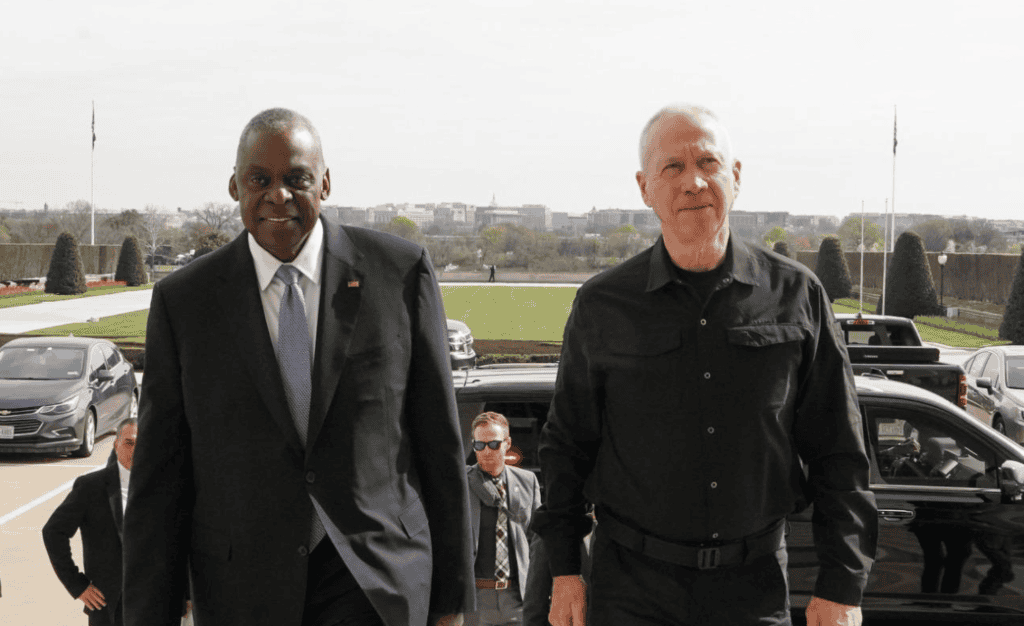
Israeli Minister of Defense Yoav Gallant arrived in Washington for a multi-day visit for meetings with Secretary of State Antony Blinken, National Security Advisor Jake Sullivan, Secretary of Defense Lloyd Austin, CIA Director Bill Burns. Gallant’s visit occurs at a tense time for US-Israeli relations, after the US abstained from a UN Security Council vote calling for a ceasefire and Israeli Prime Minister Benjamin Netanyahu subsequently cancelled a trip to Washington by senior Israeli leaders including Israel’s National Security Council head Tzachi Hanegbi and Israeli Strategic Affairs Minister Ron Dermer.
This meant that Gallant’s trip, which is important for planning Israel’s operations in Rafah in southern Gaza and discussing US arms sales to Israel, does not dovetail with a wider visit by Israeli officials. It also highlights the divides between Gallant’s role in the war effort and the political infighting in Israel’s War Cabinet. For example, Gallant unveiled in January a plan for the “day after” in Gaza while the Prime Minister unveiled a plan in February.
“I am traveling to the United States today upon invitation by the U.S. government. This is a very important trip during which I will meet with a series of senior U.S. officials, firstly the Secretary of Defense, as well as the Secretary of State, National Security Advisor, and Director of the CIA,” Gallant said on the eve of his trip on March 24. He said the visit would focus on preserving Israel’s qualitative military edge (QME), a reference to Israel acquiring more munitions and warplanes. Israel is already set to acquire much-needed CH-53K heavy lifter helicopters and KC-46 refuelers and has sought to increase its number of F-35s, F-15s, and Apache helicopters.
Gallant’s visit coincides with a marked uptick in pressure from the US on Israel to not go into Rafah, the last major Hamas stronghold in Gaza. This as Hamas resumed rocket fire after a two-month hiatus, targeting the Israeli coastal city of Ashdod. Gallant will also address Israel’s security needs in the north, where Hezbollah has continued to carry out attacks, most recently targeting the Israeli base on Mount Meron on March 26. “I will also raise the growing threats on our northern border, and our commitment to returning displaced communities to their homes,” Gallant said.
Gallant believes that the outcome of the war in Gaza and on other fronts “will shape the region for years to come.” He has said that Israel’s goal is to destroy Hamas as a military and governing authority in Gaza. Speaking with Blinken he “emphasized that Israel will not cease operating in Gaza until the return of all the hostages. Only a decisive victory will bring to an end of this war,” Gallant’s office said in a statement. Meeting with Austin on March 26, Gallant noted that Israel is facing attacks from seven different fronts, referring to Gaza, the Red Sea, Lebanon, Syria, the West Bank, and apparently Iraq and Iran. The Israeli Defense Minister noted that Hamas leader Ismael Haniyeh was travelling to Iran this week to meet Iran’s leaders. Gallant pointed to this to reiterate that the Islamic Republic of Iran is behind the attacks on Israel from the numerous fronts he referenced.
While Gallant was in Washington, the IDF announced that fifty launches were carried out from Lebanon targeting an IDF base on Mount Meron. “IDF fighter jets struck a landing area and several military structures inside a military compound used by Hezbollah’s aerial unit in the area of Tell Wardeen, deep inside Lebanese territory,” the IDF said. Israel’s retaliation sent a message that an escalation of this magnitude would be responded to with deeper raids conducted by Israel.







